 Northern
California has always been a central hub of great American guitar
music since the 1950’s and ‘60s. That legacy of groundbreaking
guitar sounds from NorCal continues on with the 2014 CD by guitarist
Carl Weingarten. That CD, Life Under Stars puts
the term “experimental guitar music” into a new 21st century
context. Carl has always worked with excellent musicians and many
of those same musicians are back again for Life Under Stars—including
Michael Manring (bass), Celso Alberti (drums), Jeff
Oster (trumpet, flugelhorn), Robert M. Powell (pedal steel
guitar) and other fine musicians. Commenting on the challenge of bringing
his unique and experimental, yet very accessible music into the 21st
century music world, Carl tells mwe3.com, ‘There’s lots
of great players working out there. I just try to stay inspired and
keep doing the best music I can. Most working musicians, if they stick
with it long enough, become the artist they’re meant to be. It
doesn’t mean one stops growing or exploring. It means, for me
at least, that I believe in what I do and know what my range is.’
In the sense that—as a guitar innovator, Weingarten prefers meticulously
recorded sonics compared to sheer experimentalism—he’s clearly
a throwback to a time of rare groundbreaking events in music history.
The amazing sounds on Life Under Stars will open your ears
to Carl Weingarten's brave new world of guitar artistry. www.mphase.com
Northern
California has always been a central hub of great American guitar
music since the 1950’s and ‘60s. That legacy of groundbreaking
guitar sounds from NorCal continues on with the 2014 CD by guitarist
Carl Weingarten. That CD, Life Under Stars puts
the term “experimental guitar music” into a new 21st century
context. Carl has always worked with excellent musicians and many
of those same musicians are back again for Life Under Stars—including
Michael Manring (bass), Celso Alberti (drums), Jeff
Oster (trumpet, flugelhorn), Robert M. Powell (pedal steel
guitar) and other fine musicians. Commenting on the challenge of bringing
his unique and experimental, yet very accessible music into the 21st
century music world, Carl tells mwe3.com, ‘There’s lots
of great players working out there. I just try to stay inspired and
keep doing the best music I can. Most working musicians, if they stick
with it long enough, become the artist they’re meant to be. It
doesn’t mean one stops growing or exploring. It means, for me
at least, that I believe in what I do and know what my range is.’
In the sense that—as a guitar innovator, Weingarten prefers meticulously
recorded sonics compared to sheer experimentalism—he’s clearly
a throwback to a time of rare groundbreaking events in music history.
The amazing sounds on Life Under Stars will open your ears
to Carl Weingarten's brave new world of guitar artistry. www.mphase.com
mwe3.com presents an interview
with
CARL WEINGARTEN
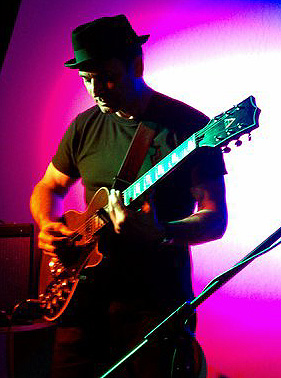 mwe3:
What’s the good word from the Bay Area Carl? Have things improved
on all fronts there over the past few years? I guess musically the
West Coast musicians were always one step in front of the rest of
the country.
mwe3:
What’s the good word from the Bay Area Carl? Have things improved
on all fronts there over the past few years? I guess musically the
West Coast musicians were always one step in front of the rest of
the country.
Carl Weingarten: Hey Robert. Yes, it's been a very busy few
years, that’s for sure. I’m not sure about a step ahead,
but if the west coast is anything, it’s diverse. There’s
a lot going on. I just think of it as a land of extremes.
mwe3: Your new CD, Life Under Stars is your best album
yet. I wanted to ask you about the album title and that amazing cover
art. Is there a concept here? There’s something radioactive about
that cover! (radio friendly?) Can you shed some light on the title
and cover art concept of your new album?
Carl Weingarten: Thanks Robert. Sure. I made the photo a year
ago with my girlfriend. I had this idea of a photograph at the beach
with her in a vintage dress, and the umbrella covering her face. I
like photos where the subject is mysterious, or simply out of place
with the setting. We arrived late in the afternoon and the sun was
going down so we set up by an outlet to the San Leandro Bay. I took
about 50 photos of her standing in place holding the umbrella in various
positions, while trying not to get knocked over by the wind. We were
losing the light, and when I accidentally overexposed several shots,
the umbrella ended up blending perfectly into the background. The
image itself is a mix of fantasy and vintage photography. The title
of the photo is L'ombre de la Memoire which roughly translates
to The Memory Shade. I took all the photos for the CD jacket. The
theme is life and mystery.
mwe3: How would you compare Life Under Stars with your
solo album from 2012, Panomorphia, both compositionally and
recording wise? You recently spoke about the great working relationship
that you have with musicians you record with including Jeff Oster,
Michael Manring and Celso Alberti.
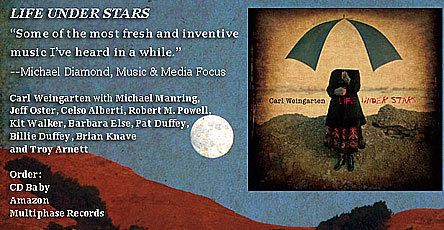 Carl
Weingarten: The two albums overlapped, but they’re very different.
After Local Journeys, I went through a period unsure if I was
going to make another album. I wasn't happy with my guitar playing
and I was fishing around for a new direction without much success.
I did a lot of writing, and recorded a number of songs in my studio,
but it was slow going. Fortunately, I met a great studio engineer
by the name of Noah Perry, and we began working together. There was
no plan at first. He was up for anything so we had session after session
working on whatever music inspired me at the moment. Manring, Oster,
and Alberti are the main guys who run through both CDs, even though
other musicians like Kit Walker and Robert Powell contributed quite
a bit as well. Michael Manring and I have been friends for almost
20 years now. Our work together goes back to Blue Faith.
Carl
Weingarten: The two albums overlapped, but they’re very different.
After Local Journeys, I went through a period unsure if I was
going to make another album. I wasn't happy with my guitar playing
and I was fishing around for a new direction without much success.
I did a lot of writing, and recorded a number of songs in my studio,
but it was slow going. Fortunately, I met a great studio engineer
by the name of Noah Perry, and we began working together. There was
no plan at first. He was up for anything so we had session after session
working on whatever music inspired me at the moment. Manring, Oster,
and Alberti are the main guys who run through both CDs, even though
other musicians like Kit Walker and Robert Powell contributed quite
a bit as well. Michael Manring and I have been friends for almost
20 years now. Our work together goes back to Blue Faith.
Musicians would drop by and contribute to whatever I had going on.
It took a while, but we compiled tracks for several albums, actually
several different albums. The music was good, but the pieces were
all over the place in terms of style. So my challenge became finding
the common thread through all those songs. In the end, we got down
to two different themes. The first became Panomorphia, which
mixed space-guitar with a jazz trio. The other songs were the more
down-to-earth, acoustic ensemble compositions that became Life
Under Stars. Panomorphia was finished in 2012, so it was
released first. Life Under Stars took much longer. There were
more sessions, more musicians involved, and I wanted it to be right.
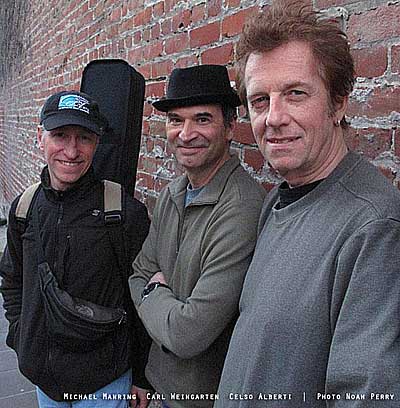 mwe3:
Have you guys become like the Northern California wrecking crew? (lol)
Would it be easier to form a band with a name with these guys? It
seems like Americans love names of bands.
mwe3:
Have you guys become like the Northern California wrecking crew? (lol)
Would it be easier to form a band with a name with these guys? It
seems like Americans love names of bands.
Carl Weingarten: We do have a band name actually, Blue Eternity.
We needed something other than our names listed at the top of the
poster. And you’re right, people do connect easily with band
names.
mwe3: How would you describe the musical chemistry on this
album?
Carl Weingarten: Most of the musicians on the CD knew each
other and have worked together before, so there was always a lot of
respect in the room. And for those sessions when I was only working
with one or two players, they’d light up knowing who else was
already on the song. Since I prefer the complexity of music to be
in the expression and orchestration, rather than in the structure
- which is a nice way of saying I don’t use a lot of chords -
my job was to keep the musicians pointed in the right direction. Barbara
Else is a musical genius. Her flute leads on “Evie” lead
the group through the entire piece, and she usually nails it in one
or two takes. Robert Powell’s pedal steel tracks were recorded
very early on, but they were so orchestral and beautiful that I let
his parts be central to the tunes “I Remember Summer”, which
we co-wrote, and “Western Overnight”. Kit Walker’s
piano became essential to the album as well. His embellishments were
beautiful and his playing really grounded the music.
mwe3: Can you tell us something about the way the Life Under
Stars album was recorded? Were you in the same room with the other
musicians or were there a lot of sessions with overdubs? Which way
do you prefer to work, live on the fly or in the studio with lots
of overdubs and added “sweetening”?
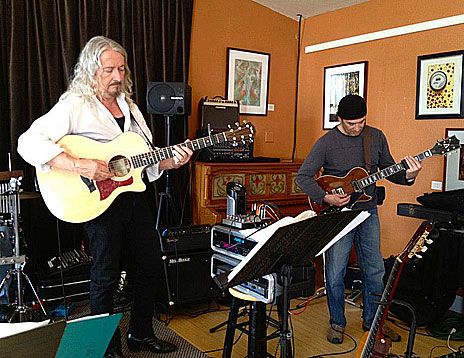 Carl
Weingarten: The basic loops, or the guitar sketches, went down
first so when the players arrived, there was a tempo, a key and progression
to work with. Then the rhythm section, and sometimes the leads, went
down live in the studio. Recording can be methodical, and overdubs
can beat the life out of a composition, so I always encourage the
musicians to play like there's an audience in front of them, and not
pay attention to me sitting in a chair under headphones looking down
at the floor. Just be expressive and spontaneous. They weren’t
takes, they were performances. Sometimes I’d have to put on the
brakes when the solos would start to go on too long, and there were
sessions where we’d have to craft a passage here, a phrase there.
On one occasion the group must have spent 20 minutes discussing a
particular track until Celso stood up and said, “let’s just
play”, and it rocked. Everyone delivered the goods. It was a
thrill for me.
Carl
Weingarten: The basic loops, or the guitar sketches, went down
first so when the players arrived, there was a tempo, a key and progression
to work with. Then the rhythm section, and sometimes the leads, went
down live in the studio. Recording can be methodical, and overdubs
can beat the life out of a composition, so I always encourage the
musicians to play like there's an audience in front of them, and not
pay attention to me sitting in a chair under headphones looking down
at the floor. Just be expressive and spontaneous. They weren’t
takes, they were performances. Sometimes I’d have to put on the
brakes when the solos would start to go on too long, and there were
sessions where we’d have to craft a passage here, a phrase there.
On one occasion the group must have spent 20 minutes discussing a
particular track until Celso stood up and said, “let’s just
play”, and it rocked. Everyone delivered the goods. It was a
thrill for me.
mwe3: And how do those different recording scenarios impact
your creative performance or the intensity on a specific track?
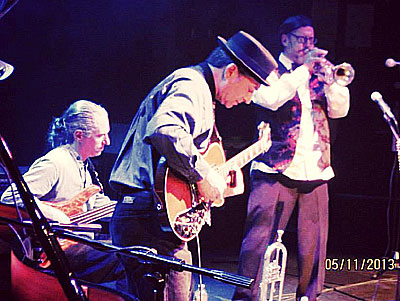 Carl
Weingarten: The longer I hold off my own tracking, as the other
players perform their parts first, the more challenging it is for
me when it’s my turn. It’s a privilege to work with great
musicians, but it also comes with responsibility. There’s no
holding back. We set a high bar for each other, and everyone, including
me, has to measure up. The music comes first. There’s a lot of
music out there where the backing group is just propping up the featured
artist. Or as sometimes is the case with technology and software,
where it’s obvious the computer is more creative than the human
composer. For most of my own tracking, I preferred to work alone or
at Noah’s studio where I’d set up my rig in the control
room. I like to live with the music for a while first, then work very
quickly on my parts.
Carl
Weingarten: The longer I hold off my own tracking, as the other
players perform their parts first, the more challenging it is for
me when it’s my turn. It’s a privilege to work with great
musicians, but it also comes with responsibility. There’s no
holding back. We set a high bar for each other, and everyone, including
me, has to measure up. The music comes first. There’s a lot of
music out there where the backing group is just propping up the featured
artist. Or as sometimes is the case with technology and software,
where it’s obvious the computer is more creative than the human
composer. For most of my own tracking, I preferred to work alone or
at Noah’s studio where I’d set up my rig in the control
room. I like to live with the music for a while first, then work very
quickly on my parts.
mwe3: What guitars and other fretboard instruments are you
featuring on Life Under Stars and have there been any new developments
in the guitar world for you?
Carl Weingarten: My own studio is pretty old school. I have
an Alesis HD-24 recorder, Mackie mixer, and a rack of outboard gear,
with a couple of old keyboards including my trusty Korg DSS-1. There’s
my dobro, plus a classical and steel string acoustic as well as my
electric guitar. My pedal board is a little more upscale, with various
pedals and delays that I shuffle around as needed. Noah’s studio
is where all the group recording, hi-tech editing, and mixing would
happen.
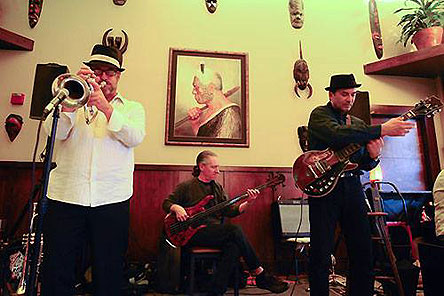 I did buy
my first new electric guitar in 35 years. Up to this point, I’ve
only had one electric guitar and that’s an old replica of a Gibson
recording model. It’s been my loyal axe from the beginning. Last
year, I went to New Orleans for the ZMR Awards ceremony with Michael
and Jeff. I almost didn’t play because, right before the show,
my guitar developed a buzz that was going through the PA. Luckily
we fixed it in time, and when I got home I took it to my guitar tech
for a checkup. The prognosis wasn’t good, and it was time for
this baby to come off the road. So I started looking around for a
new guitar, which for me was like trying to decide what car to buy
after driving only one for 35 years. It’s like, where do you
start? Fortunately, last fall I was introduced to a guitar maker by
the name of Glenn Sweetwood. I told him what I was looking for and
he encouraged me to come by his shop. His place is outside of Santa
Cruz, way up in the hills. He gave me two generous hours of his time
while I test-drove a half-dozen guitars he had set out for me. We
finally settled on a beautiful custom model with Jimmy Wallace pickups.
I couldn’t be happier.
I did buy
my first new electric guitar in 35 years. Up to this point, I’ve
only had one electric guitar and that’s an old replica of a Gibson
recording model. It’s been my loyal axe from the beginning. Last
year, I went to New Orleans for the ZMR Awards ceremony with Michael
and Jeff. I almost didn’t play because, right before the show,
my guitar developed a buzz that was going through the PA. Luckily
we fixed it in time, and when I got home I took it to my guitar tech
for a checkup. The prognosis wasn’t good, and it was time for
this baby to come off the road. So I started looking around for a
new guitar, which for me was like trying to decide what car to buy
after driving only one for 35 years. It’s like, where do you
start? Fortunately, last fall I was introduced to a guitar maker by
the name of Glenn Sweetwood. I told him what I was looking for and
he encouraged me to come by his shop. His place is outside of Santa
Cruz, way up in the hills. He gave me two generous hours of his time
while I test-drove a half-dozen guitars he had set out for me. We
finally settled on a beautiful custom model with Jimmy Wallace pickups.
I couldn’t be happier.
mwe3: I guess the good news is, no matter what gear you use,
you always make the guitar sound like it’s never been done before.
Carl Weingarten: That’s really high praise, Robert, thanks.
The early songs on Life Under Stars, like “A Different
Rain” is my old axe, and the later material like “Mr. Sundance”
features the Sweetwood. You’re right, I still sound like me on
either instrument. I guess it’s in the fingers. If I have my
own sound, it just happened over time as every project and musician
I worked with pushed me in one direction or another.
Much of what I’ve done, honestly, was aim at music that influenced
me, only to end up somewhere else. And that’s the way it works
for most artists. A few years ago, I asked Sonny Landreth how he came
to develop his style of fretting behind the slide, and he told me
that during a performance he needed a certain chord, and realized
that the missing note was a fret directly behind his slide, if he
could only get a finger on it. “So you discovered it by chance,”
I said joking with him. “Oh yes,” he replied, “it’s
a thin line between chance and genius.”
mwe3: How many albums have you released so far? Including the
albums you made with your 1980s band Delay Tactics.
 Carl
Weingarten: Looks like 21 albums as either artist and/or collaborator.
I also have some session credits, playing on other people’s CDs.
I also produced three cassette compilations of St. Louis Bands during
the 1980’s called The Urban Cabaret.
Carl
Weingarten: Looks like 21 albums as either artist and/or collaborator.
I also have some session credits, playing on other people’s CDs.
I also produced three cassette compilations of St. Louis Bands during
the 1980’s called The Urban Cabaret.
mwe3: Is there a chance for a Carl Weingarten anthology / collection
CD to help chronicle your history? What would that look like in your
estimation and better still, sound like? Is there a challenge in making
the different albums from different times sound cohesive?
Carl Weingarten: There’s already the Hand In The Sand
compilation CD that covers releases from 1990 to 2005. It’s something
of a mid-career collection. I’ve thought about an A-Z compilation,
but the music I did at the beginning doesn’t at all resemble
what I’m doing now. So I’m not sure how I’d wrap that
all together. Funny that you ask, though. I have been approached by
a label who is interested in reissuing a 2LP set of the early Multiphase
Records vinyl era, including Submergings, Windfalls
and the Delay Tactics albums. So far we’ve had a couple
of promising conversations. Nothing in writing, yet. I’ve spoken
to my old bandmates who’ve given the green light. We’re
hoping it’s the real deal.
mwe3: And how about a Carl Weingarten DVD, is that in the works
at some point?
Carl Weingarten: If you mean a concert, it would have to be
either Blue Eternity with Celso, or the Manring-Oster-Weingarten
lineup. It would be nice to book a good venue and have a professional
crew to produce it.
mwe3: What is a Carl Weingarten live concert like? Say for
instance, what was the set list on your recent Blue Eternity show
with you Jeff Oster and Michael Manring?
Carl Weingarten: No setlist. We might cover some of Jeff’s
songs, and we did perform “Simian River” from Panomorphia,
but otherwise we don’t cover the CD material specifically. It’s
all improvised, so every show is different. I enjoy the Blue Eternity
group because the guys are fun to work with and I get to stretch out
on guitar much more than in the studio. This fall, I hope to do a
loop guitar set at the Y2K Festival, but otherwise, I’m not playing
solo concerts anymore. I’m sticking to group settings, and guest
with other artists like Ann Licator, Diane Arkenstone, and a local
jazz combo called Spiral Dance. Here’s two video links
to give you some idea of what Blue Eternity is like:
Blue
Eternity
at the 2013 ZMR Awards:
The
Blue Eternity Quartet at the Lucy Festival (Encore):
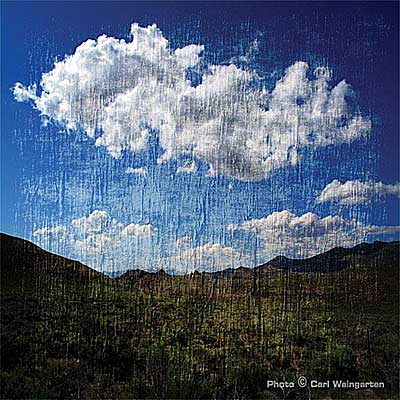 mwe3:
It’s really a shame you can’t bring your innovative guitar
sound far and wide, especially in the US, as you’re one of the
few American guitarists breaking new boundaries in music these days.
mwe3:
It’s really a shame you can’t bring your innovative guitar
sound far and wide, especially in the US, as you’re one of the
few American guitarists breaking new boundaries in music these days.
Carl Weingarten: There’s lots of great players working
out there. I just try to stay inspired and keep doing the best music
I can.
mwe3: What do you make of the current music scene in the US?
It seems like Northern California and the Pacific Northwest in general
is still the hub of everything great in the country these days.
Carl Weingarten: From the outside, it may seem that it’s
all one big scene out here, but it’s really not. It’s a
lot of very different artists and bands all trying to make a mark.
Those at the top of the industry food chain get a lot of coverage,
but it’s always been that way. There’s certainly a lot to
take in if you frequent the clubs and concert venues, but I don’t
find my inspiration there at this point. I don’t even draw from
specific artists or music like I once did. Most working musicians,
if they stick with it long enough, become the artist they’re
meant to be. It doesn’t mean one stops growing or exploring.
It means, for me at least, that I believe in what I do and know what
my range is.
mwe3: How do you plan to spread the word about Life Under
Stars moving forward?
Carl Weingarten: The CD is available online and in some stores.
We just did a big radio mailing across the U.S. and to Europe, so
fingers crossed we see some airplay. Packages went out to a number
of reviewers as well. That’s the plan. Just get the music out
there and hope it speaks for itself.
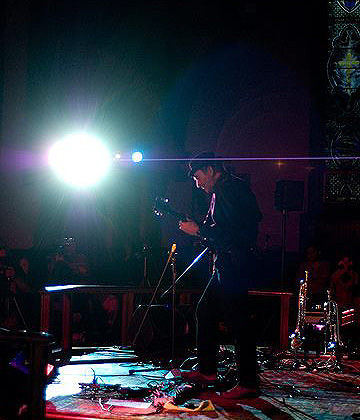 mwe3:
Last time, you said you were concerned about the over saturation of
the music world! It seems like it’s getting more and more crowded
music wise...lol which is great but what about the downside and what’s
the remedy to save the music world and most importantly give more
power back to the artists?
mwe3:
Last time, you said you were concerned about the over saturation of
the music world! It seems like it’s getting more and more crowded
music wise...lol which is great but what about the downside and what’s
the remedy to save the music world and most importantly give more
power back to the artists?
Carl Weingarten: There’s never enough good music in the
world! But the indie market is completely flooded and getting noticed
is more difficult than ever. At the moment, fashionable singer-songwriters
rule the day. As for where the music business is, that’s another
interview in itself. As unfairly as the old corporate labels treated
artists, we see now that they valued the music they published and
many of their signed artists received a lifetime of notoriety and
because of that. You can’t buy that kind of publicity now.
The internet media companies like Apple don’t care about musicians.
They started iTunes to monopolize digital distribution and drive down
the market value of music as low as possible. They’ve basically
been price fixing and there has been no oversight in how they do business.
Apple makes their money selling their pricey phones, players and computers.
Apple is subsidizing iTunes because they want music to be cheap and
plentiful in order to fill up their devices with content. It’s
too bad. And it’s worse that artists believe they have to give
away their music in order to be heard. As long as artists accept that
mentality, they’re going to get screwed. Maybe Apple should start
giving away iPads and see how that works for them?
I don’t produce pop songs. I don’t want my CDs chopped up
and sold off in pieces. Fortunately my label, Multiphase Records,
is too small to fail. It makes no difference to me whether or not
I’m on iTunes. I distribute my music exclusively through a few
musician-friendly stores like CDBaby, Bandcamp, and on a limited basis
with Amazon, where anyone who enjoys my music can easily find it.
 mwe3:
What’s your take on radio these days? Are you getting some exposure
on NPR radio and classic college radio or has the time honored method
of getting “airplay” changed?
mwe3:
What’s your take on radio these days? Are you getting some exposure
on NPR radio and classic college radio or has the time honored method
of getting “airplay” changed?
Carl Weingarten: Radio has been a good friend for a long time.
Like I mentioned, that’s where we’re promoting the CD. Public
radio was great in the 1980’s, as the indie scene heated up,
but then radio funding got cut and the bigger labels muscled their
way in to where many college stations were just playing stuff you’d
hear on commercial radio. Then college radio got better again. The
stations became better managed, organized, and the programmers really
have an ear for what’s out there.
mwe3: Be great to keep those musicians on Life Under Stars
together for more albums. Are there more musical mountains for you
to climb, so to speak?
Carl Weingarten: I always have something going. I really enjoy
producing, and this last crew was fantastic to work with. I have a
number of pieces in with the same folks, but only a couple of them
have been finished so far. Most of those relationships will continue,
I hope, though several people are living elsewhere now. I tend to
write for the musicians available at the time, so at the end of the
day, the different mix of artists keep things fresh.
 If
the music surprises me, it will likely surprise the listener too.
Lately I’ve been working on some acoustic ensemble pieces that
sound a bit like chamber music for children. I also recorded a choir
ensemble, which was fun and may develop further. Manring, Oster and
I have also been playing concerts in a planetarium theater, performing
in the dark under a full star show. Our last show sold out. The performances
were recorded and we’ll be offering them for download soon.
If
the music surprises me, it will likely surprise the listener too.
Lately I’ve been working on some acoustic ensemble pieces that
sound a bit like chamber music for children. I also recorded a choir
ensemble, which was fun and may develop further. Manring, Oster and
I have also been playing concerts in a planetarium theater, performing
in the dark under a full star show. Our last show sold out. The performances
were recorded and we’ll be offering them for download soon.
mwe3: Thanks Carl.
Carl Weingarten: Thank you, Robert, this was great.
Thanks to Carl Weingarten at www.mphase.com



